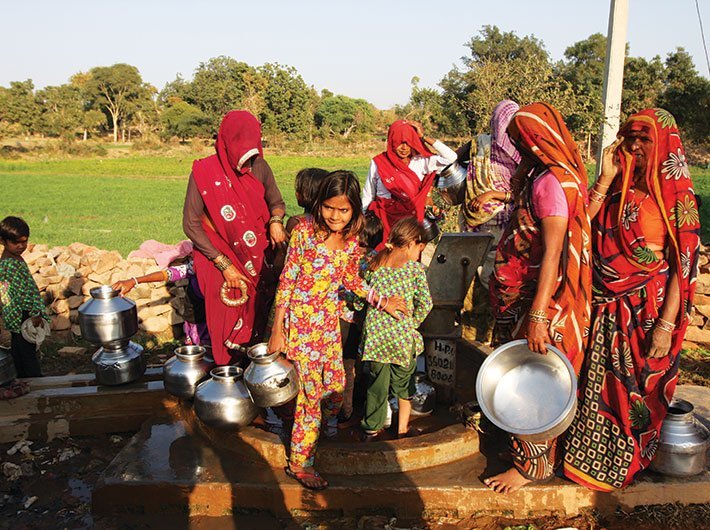This piece is based on a previous article by the authors published in Geoforum [Elsevier] in May 2019: available online: https://www.sciencedirect.com/science/article/pii/ S0016718519300764?via%3Dihub [Article DOI: https://doi.org/10.1016/ j.geoforum.2019.02.030].
A challenge to our elected officials: Visit one village and discuss the seasonal and everyday challenges of accessing water with different residents. Ask yourself: Do some residents remain water insecure and others not, and if so, why might this be the case? What will likely become clear is that water flows where social, economic and political power are, leaving some water secure and others without safe and sufficient access for their daily activities.
The clearest examples of this occur where water sources may be physically available, but certain social groups may be denied access to them. Such patterns endure in rural and urban areas both during peak times of water scarcity (e.g., a prolonged drought) and even under “normal” conditions. For instance, water is always available in a five-star hotel, on a flight, or in a railway station but the same cannot be guaranteed for the homes, pipes, and lands of marginalized people, who face social and economic challenges and trade-offs even in meeting their basic water needs.
This is India’s water crisis: An ever-present phenomenon experienced unevenly within regions, communities, and neighbourhoods. It is not suddenly now occurring and homogenously experienced by everyone. Recognising the social and institutional causes will help channelize efforts at reducing the unequal and uneven access to water – a cornerstone of the water crisis.
It is important to understand here the concept of narrative, a story with a moral or a lesson that frames the set of policy responses for a given problem. Narratives shape our way of framing problems and the corresponding solutions that are needed. For instance, in the absence of institutions to regulate resource use, ecologist Garrett Hardin predicted that resources would suffer overexploitation and become depleted in due course in what he called the “Tragedy of the Commons”. This culminated in prescriptions to nationalise natural resources or establish private property regimes. But in the years to follow, political scientist Elinor Ostrom established the potential of communities to govern natural resources sustainably on the basis of rules in use devised for this purpose. The ability of communities to manage natural resources sustainably became the dominant narrative of the 1980s and 1990s and led to many efforts to establish community-based natural resource management institutions.
Too often, narratives of India’s water crisis suggest it to revolve completely around the physical unavailability of water. Efforts therefore tend to be technocratic, located in supply augmentation and water conservation. This has, in fact, been the dominant approach of India's water provisioning departments, and continues to underlie recent initiatives like the Jal Shakti mission.
One reason that these efforts are limited in their impact is the mandate and professional composition of water supplying agencies like the Public Health and Engineering Department (PHED), which supplies drinking water to most of our rural areas. The same could be said about organizations like the state level Irrigation Departments or Ground Water Boards. The engineering orientation of these organizations has led them to be staffed predominantly by engineers. Since engineering has been a professional choice mainly of men, this translates into a gender imbalance in the water sector as well. A patriarchal context of water provisioning means that women or even other social groups that are marginalised find little space to influence processes of water provisioning.
Redefining the water crisis as a socio-institutional one might entail, as a first-step, changing the composition and staffing of utilities engaged in provisioning water to better include the representation of the interests of women and other social groups, and professionals with non-engineering skill sets (e.g., in social sciences) as a starting point through which different viewpoints and solutions could be expressed.
Many of our cities have grown by engulfing the water bodies around their periphery. These include major cities like Chennai, Bengaluru, Hyderabad, and Gurugram. These water bodies are constantly encroached upon, or acquired by the state and real-estate entities. On the one hand, this has been associated with incidences of urban flooding. On the other hand, it has dispossessed many communities that depended on these water sources for livelihood purposes. It is paradoxical that on the one hand we commit to recharging and conserving water, and on the other hand, in the garb of urbanization, we continue to deny communities access to ponds, lakes and wetlands, that have performed multiple functions for them. This must change, if our water crisis is to be redressed in ways that are both sustainable and equitable.
A scare is often painted on the prospect of so-called “water wars” emerging from situations of water scarcity. Quite the contrary is also true: communities cooperate in shaping collective responses to water scarcity. They mobilise their networks and social relationships. These efforts need to be better understood, documented and supported. State agencies should work closely with NGOs in facilitating this process of community organization and mobilisation, building on local social capital.
We need renewed attention in formal policy approaches to the social and institutional causes that shape water access. State agencies should focus their attention on correcting the regional and temporal imbalances in water access, on their own, or in partnership with academics, NGOs, and civil society organizations. For a new and more sustained approach to tackling the water crisis, the way we see the water crisis has to change.
Vishal Narain is professor, Management Development Institute, Gurgaon. Sameer Shah is a PhD candidate with University of British Columbia, Vancouver, Canada.
